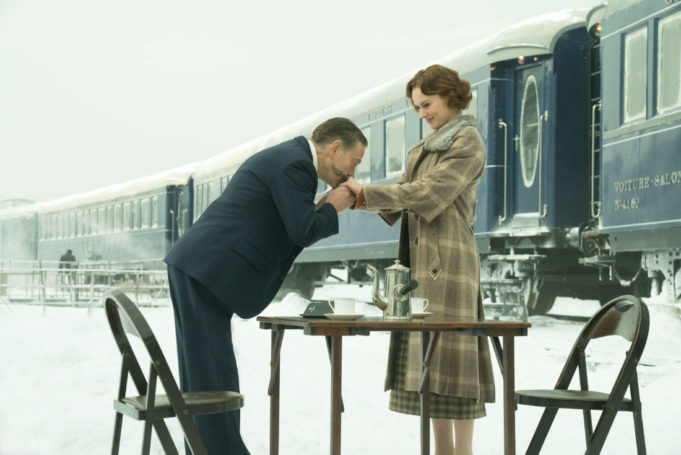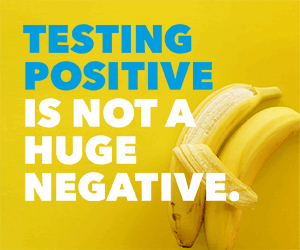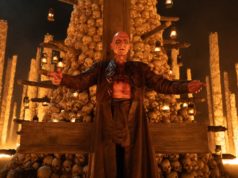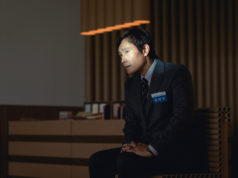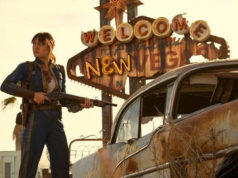Kenneth Branagh’s new version of Murder on the Orient Express feels curiously old-fashioned. Not because it’s set in 1934, but because Branagh is taking a well-known literary property and stacking it with Oscar nominees, betting that sheer star power will bring the audience to the multiplex. Certainly the material, with its international cast and glitzy setting, cries out for such an approach. The director used much the same tactic with his Shakespeare adaptations back in the 1990s, and it worked fairly well back then. Whether this strategy will still work in the Netflix era remains to be seen. As a movie, I can say that this detective thriller starts like gangbusters before fading.
Based on Agatha Christie’s novel, the film stars Branagh as Hercule Poirot, the Belgian detective who has just closed a case in Jerusalem and is now returning to his London home on the luxurious Orient Express, traveling from Turkey all the way to France. However, his hopes for a relaxing journey are dashed by Ratchett (Johnny Depp), a shady art dealer who’s afraid of unnamed enemies and offers the world-famous sleuth thousands to act as his bodyguard. Poirot turns him down for a variety of reasons, including a straight-out “I do not like your face.” Hours later, when an avalanche partially derails the train, Ratchett is found stabbed to death in his bed. The killer must still be on board — could it be the randy American widow (Michelle Pfeiffer)? The fanatical Spanish missionary (Penélope Cruz)? The starchy English governess (Daisy Ridley)? The old Russian princess (Judi Dench)? They’re all suspects, because the victim turns out to be a man so horrible that anyone who discovered his true identity would automatically have a motive to kill him.
Movies always get Poirot wrong by casting swaggering British actors in the role: Albert Finney in the 1974 version of Murder on the Orient Express, Peter Ustinov in 1978’s Death on the Nile and subsequent films. Branagh isn’t as miscast as them, but he still can’t resist playing Poirot’s love of dainty French pastries and borderline anal retentiveness for comedy — after a civil conversation with a military officer, the detective tells him, “Straighten your tie.” Dexterously though the actor does this while injecting a welcome self-deprecating streak, the character is a fussy, extremely logical eccentric rather than a showman. When this Poirot unironically declares himself “probably the greatest detective in the world,” it feels wrong. That’s why the definitive screen Poirot remains David Suchet during his decades of work for British television.
The director does burst out of the gate, reveling in the opulence of the train’s first-class accommodations. You can forgive his indulgences like filming himself at the end of a table filled with scrumptious-looking Turkish flatbreads, or a lengthy tracking shot of Poirot walking through Istanbul’s Sirkeci Railway Station and then the train, passing by almost every major character on the way. That’s because he makes such good use of overhead shots to film the cramped quarters of the train, especially when Poirot gives us our first look at the murder scene.
While Christie’s novel is filled with characters making offensive racial observations, screenwriter Michael Green (who also co-wrote Blade Runner 2049 and Logan just this year) is able to do some innovative things with those to make them palatable to our modern sensibilities, including characters like a Cuban-American car dealer (Manuel Garcia-Rulfo) and a black English doctor (Leslie Odom Jr.) striking sparks off a racist Austrian professor (Willem Dafoe). An even bigger issue with the source material is that the plot stops completely along with the train, as Poirot spends the rest of the book interviewing suspects and gathering evidence. Green writes some further action set pieces into the story that are credible if you take them as the killer’s attempts to distract the detective, and Branagh gets around the parade of interviews by intercutting them and having them take place in different locations around the train.
Unfortunately, the 114-minute running time spreads this heavyweight supporting cast too thin, and most of them don’t get the latitude to make much of their characters. As Ratchett’s jittery secretary, Josh Gad does make the most of that Christie staple, a suspect breaking down under interrogation to reveal what he’s been hiding, and Lucy Boynton makes an impression as a drug-addicted, paranoid young countess. Walking off with the acting honors here is Pfeiffer, with a great climactic monologue where she offers to take the fall for the real culprit. (She was one of my favorite actresses during the early 1990s. I badly missed watching her act.)
This movie’s ending is wrong, though I should say that Christie’s original ending is also wrong, coming way too abruptly. Green does have the right idea in having Poirot conclude that the case has no satisfactory conclusion, and yet some combination of the director, the writer, and the star botches the execution. For one thing, too much of Poirot’s police work here depends on his prior knowledge of a criminal case that involves many of the suspects — we want to see our detective read clues and catch people out in their lies instead of using information that we’re not privy to. Branagh’s performance doesn’t quite nail down the vibe of a rationalist confronting a case powered by emotions that he can’t reason away. We’ve seen other movies where the detective sympathizes so far with the killer that he lets them go after finding them, and this one isn’t anywhere near the best of those. Murder on the Orient Express fails as a piece of detective fiction, though it’s a smashing success as a tableau of beautiful people wearing beautiful clothes on beautiful sets. As a vehicle for its glamorous actors, its performance there is mixed. In the final tally, I found enough enjoyment here to make this expensive ride worth it. Shame about the end, though.
Murder on the Orient Express
Starring Kenneth Branagh, Michelle Pfeiffer, and Johnny Depp. Directed by Kenneth Branagh. Written by Michael Green, based on Agatha Christie’s novel. Rated PG-13.



